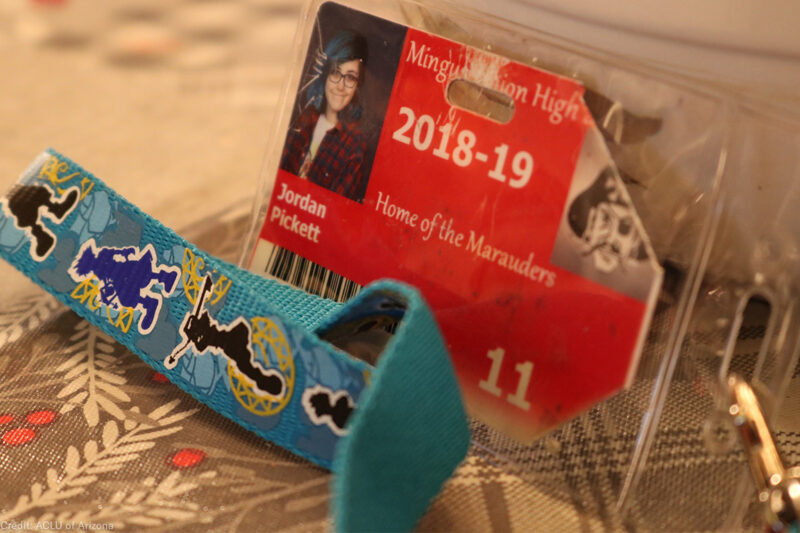My Child Has to Show Her Entire School That She’s Failing With a ‘Scarlet Badge’


UPDATE: Mingus High has revised its "scarlet badge" policy. The new policy protects students’ private academic information and eliminates the public humiliation many upperclassmen, like Jordan, experienced when they had to display their academic achievement to the entire school. Mingus will issue a universal ID for all students, regardless of academic achievement. Read Mingus' new badge policy here.
When my daughter Jordan began her junior year at Mingus High School in Cottonwood, Arizona, she immediately felt stigmatized. On her first day of school, the school’s administration forced Jordan to wear a bright red identification badge. Everyone on campus knows what this “scarlet badge” means. Upperclassmen at Mingus wear grey colored badges, but any junior or senior student with missing credits are given a red badge, and it doesn’t signify courage.
Publicly shaming my child and countless of other students for falling behind academically is wrong. I know how hard my daughter is working to get her grades up, and I know how discouraged she feels when she walks into school every morning with the “scarlet badge.” Yet she knows that every time a teacher or fellow student sees her red badge they think less of her.
In September, Jordan, her friend Jonah, and one other student took initiative and went directly to Mingus High’s school board. They shared how the “scarlet badge” was leading to an increase in bullying, harassment, and discrimination. The board listened to their comments and only revoked the badge for one student who has a learning disability. They did not change the policy.
I decided to contact the ACLU of Arizona’s Demand to Learn campaign. Aimed at eliminating practices that lead to student withdrawal, I wrote to them about my concerns with the “scarlet badge.” I worried that the academic pressure that the “scarlet badge” inflicts in students can lead to further disengagement from class. What’s more, Mingus is one of the few high schools in the area we live in. Transferring schools is not an option for students who are bullied for struggling academically.
The ACLU of Arizona sent a letter to Mingus, notifying them that their badge scheme is unlawful. A student’s academic information is private, but the “scarlet badge” forces certain upperclassmen to display their sensitive academic information to everyone on campus. This is a violation of the Family Education Rights and Privacy Act. Under FERPA, public schools may only disclose student education records to authorized school officials, such as teachers. Fellow students are not authorized officials. Yet, by forcing Jordan to walk around with a badge that lets the whole school that she’s missing credits, the school is advertising her academic achievement level.
This badge scheme subjects all students, particularly students with learning disabilities, to ridicule and discrimination. Students with learning disabilities, who may already struggle to keep up, have faced increased pressure in their academic performance knowing that other students will know what their grades are if they are given a “scarlet badge.”
High school is hard enough. Students like my daughter should not be publicly shamed for falling behind academically. Jordan and her classmates head back to Mingus this week for a new semester. If any upperclassmen had difficulty with a class last semester, all their friends will know if they return to class with a “scarlet badge.” Although Mingus has yet to revoke the policy, I’m proud of my daughter and her friends for speaking out against it.
I know it wasn’t easy, but I hope their activism will inspire other students and parents to stand up against the “scarlet badge” policy.
Jennifer Lansman is the mother of a student at Mingus High School in Cottonwood, Arizona.
Sign up for the ACLU’s Best Reads and get our finest content from the week delivered to your inbox every Saturday.



